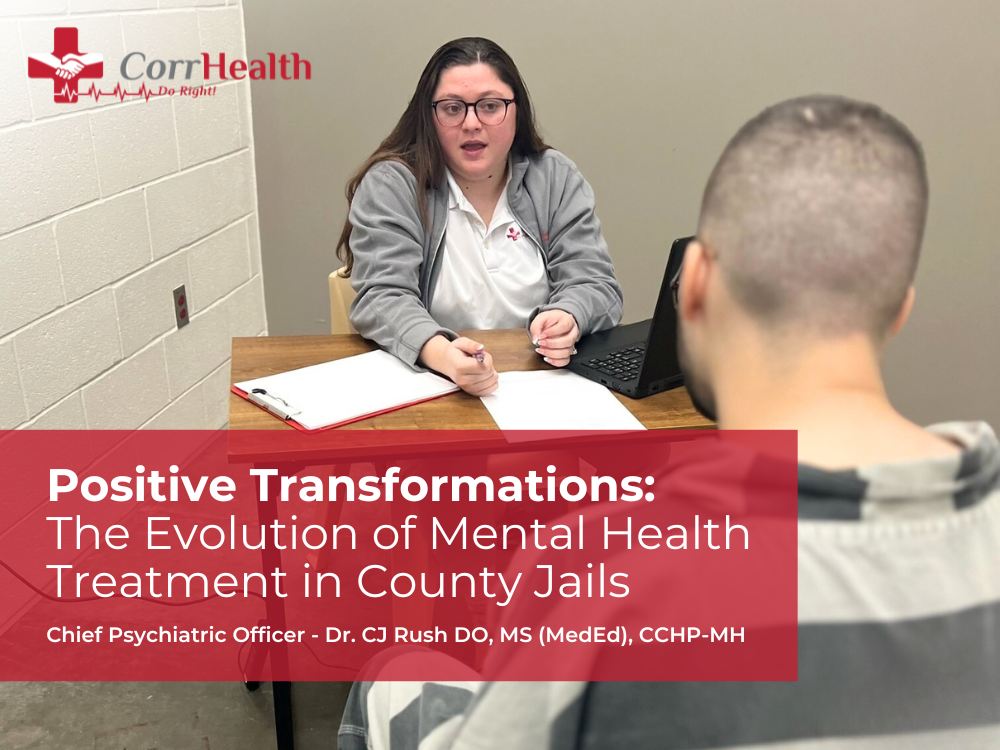The integration of mental health treatment into county jails has marked a significant positive shift in the American criminal justice system. Since its inception in the 1970s, this new model has transformed the approach from purely punitive to a more comprehensive model of rehabilitation and care.
The foundation for mental health services in correctional facilities was laid by landmark court decisions, particularly Estelle v. Gamble (1976). This ruling established that denying medical care to inmates constituted “cruel and unusual punishment,” creating a legal requirement for adequate healthcare, including mental health treatment, in correctional settings[1].
The 1980s saw the development of standardized screening protocols and assessment tools specifically designed for correctional environments. These innovations allowed facilities to identify inmates with mental health needs more effectively upon intake, leading to earlier interventions and better outcomes[1]. This marked a crucial step forward, as previous systems often failed to recognize mental health conditions until they reached crisis levels.
Today’s correctional mental health care encompasses a wide range of evidence-based treatments:
- Cognitive Behavioral Therapy: Many facilities now offer this effective form of treatment.
- Group Counseling: Inmates can participate in therapeutic group sessions.
- Medication Management: Programs to ensure proper administration and monitoring of psychiatric medications.
- Specialized Mental Health Units: Staffed by trained professionals, including psychiatrists, psychologists, and mental health nurses[1]. These dedicated units provide a more therapeutic environment for inmates with severe mental illness, reducing the risk of deterioration and improving treatment outcomes.
Technology’s Role
Technology has also played a crucial role in modernizing correctional mental health care:
- Electronic Health Records: Improved coordination between healthcare providers and better tracking of treatment outcomes.
- Telepsychiatry Services: Expanded access to mental health professionals in rural or underserved areas, addressing the persistent challenge of staff shortages[1].
Innovative Programs
Washington County, Texas: A Model for Rural Jails
In Washington County, Texas, Chief Sheriff’s Deputy Eric Hensley implemented a psychological telehealth program in partnership with Texas A&M University. This innovative approach has allowed an estimated 150 incarcerated individuals to participate in virtual group or one-on-one counseling[2]. The program’s success has led to its replication in two other rural Texas counties.
Trauma-Informed Care
Recent years have seen increased focus on trauma-informed care within correctional settings. This approach recognizes the high prevalence of trauma among incarcerated individuals and emphasizes creating environments that promote healing rather than re-traumatizing the patient. Facilities implementing trauma-informed practices have reported reduced instances of self-harm and improved behavioral outcomes[1].
Training and Education
Modern training curricula for correctional officers now include extensive education on mental health awareness, crisis intervention, and de-escalation techniques. This enhanced training has led to more appropriate responses to mental health crises and better outcomes for both inmates and staff[1].
Community Reintegration
The introduction of discharge planning and community reintegration programs represents another significant advancement. These initiatives help ensure continuity of care as inmates transition back into society, connecting them with community mental health resources and support services. This approach has demonstrated promising results in reducing recidivism rates among individuals with mental health conditions[1].
State-Level Reforms
Several states have implemented reforms to address mental health issues in their justice systems:
Kentucky
Kentucky passed legislation allowing alternative treatment systems for individuals with mental health needs. This approach aims to reduce unnecessarily high incarceration levels and alleviate strain on the justice system[3].
Connecticut
Connecticut’s Senate Bill 448, enacted in 2022, requires every prison to have a minimum of four mental health professionals. It also mandates that any inmate who requests to see a mental health professional, or is referred by a medical professional, must receive care. This care can include both therapy and medication based on individual evaluations[3].
Positive Outcomes
The implementation of these mental health services in county jails has led to several positive outcomes:
- Reduced Conflicts: In Washington County, Texas, the introduction of telehealth counseling has resulted in fewer fights among inmates[2].
- Improved Behavioral Outcomes: Facilities implementing trauma-informed practices have seen reductions in self-harm incidents[1].
- Better Identification of Mental Health Needs: Standardized screening tools have improved the recognition of mental health conditions upon intake[1].
- Continuity of Care: Discharge planning and community reintegration programs have helped reduce recidivism rates among individuals with mental health conditions[1].
Challenges and Future Directions
Despite these positive developments, challenges remain. Resource limitations, overcrowding, and staff retention issues continue to impact the quality and accessibility of mental health services in many facilities. However, innovative approaches such as peer support programs and alternative treatment courts demonstrate the field’s ongoing commitment to improvement and reform[1].
The evolution of mental health care in county jails reflects a broader societal shift toward understanding mental health as an essential component of overall well-being. This transformation has not only improved outcomes for incarcerated individuals but has also contributed to safer correctional environments and more successful rehabilitation efforts. As research continues to advance and new treatment modalities emerge, the field of correctional mental health care promises continued positive change in the years ahead.
Dr. C.J. Rush D.O., M.S.(MedEd), CCHP-MH
Chief Psychiatric Officer
Sources:
- [1] The-Evolution-of-Mental-Health-Treatment-in-Correctional-Healthcare.docx https://ppl-ai-file-upload.s3.amazonaws.com/web/direct-files/51943798/fbc347d0-21e2-485d-b66a-040e7c5134b9/The-Evolution-of-Mental-Health-Treatment-in-Correctional-Healthcare.docx
- [2] ‘Planting Seeds of Change’: In Rural Counties, Expanding Jail … https://www.ruralhealthinfo.org/rural-monitor/jail-mental-health-services
- [3] States Look to Mental Health Reforms to Alleviate Stress on Justice … https://alec.org/article/states-look-to-mental-health-reforms-to-alleviate-stress-on-justice-system/
- [4] [PDF] Providing Services for Jail Inmates With Mental Disorders https://www.ojp.gov/sites/g/files/xyckuh241/files/media/document/162207.pdf
- [5] Reducing Mental Illness in Rural Jails https://www.naco.org/resources/reducing-mental-illness-rural-jails
- [6] Outcomes of Psychological Therapies for Prisoners With Mental … https://pmc.ncbi.nlm.nih.gov/articles/PMC5518650/
- [7] Prison and Mental Health Reform – CONCEPT Professional Training https://concept.paloaltou.edu/resources/business-of-practice-blog/prison-and-mental-health-reform
- [8] Improving mental health for inmates https://www.apa.org/monitor/2019/03/mental-heath-inmates
- [9] Mental Healthcare Practices from Entry to Release across … https://pmc.ncbi.nlm.nih.gov/articles/PMC10996800/
- [10] [PDF] How to Reform Correctional Mental Health Care | Manhattan Institute https://media4.manhattan-institute.org/wp-content/uploads/how-to-reform-correctional-mental-health-care.pdf
- [11] Serious Mental Illness Prevalence in Jails and Prisons https://www.tac.org/reports_publications/serious-mental-illness-prevalence-in-jails-and-prisons/
- [12] Unjust Punishment: The Impact of Incarceration on Mental Health https://nysba.org/unjust-punishment-the-impact-of-incarceration-on-mental-health/
- [13] Mental health treatment in correctional facilities https://mhanational.org/issues/mental-health-treatment-correctional-facilities
- [14] Mental health | Prison Policy Initiative https://www.prisonpolicy.org/research/mental_health/
- [15] Mental Health Treatment While Incarcerated – NAMI https://www.nami.org/advocacy/policy-priorities/improving-health/mental-health-treatment-while-incarcerated/
- [16] Inmate Healthcare recommendations | Criminal Justice Reforms … https://justicereforms.santaclaracounty.gov/draft-inmate-healthcare-hlc-recommendations-complete
- [17] Decriminalizing Mental Illness and Promoting Mental Health Equity https://www.psychiatry.org/news-room/apa-blogs/decriminalizing-mental-illness
- [18] County-Level Reforms Related to Correctional Confinement https://texascje.org/2019-legislation-county-level-reforms-related-correctional-confinement
- [19] How to Reform Correctional Mental Health Care – Manhattan Institute https://manhattan.institute/article/how-to-reform-correctional-mental-health-care
- [20] Long-Term Solutions to the Overincarceration of People With Mental … https://www.americanprogress.org/article/long-term-solutions-to-the-overincarceration-of-people-with-mental-health-disabilities/
- [21] Results of the Brief Jail Mental Health Screen Across Repeated Jail … https://pmc.ncbi.nlm.nih.gov/articles/PMC6857168/
- [22] County Jails House Fewer Inmates, but Over Half Face Mental … https://www.ppic.org/blog/county-jails-house-fewer-inmates-but-over-half-face-mental-health-issues/
- [23] Persons with severe mental illness in jails and prisons: a review https://pubmed.ncbi.nlm.nih.gov/9550238/
- [24] Multi-Level Barriers to Prison Mental Health and Physical … – Frontiers https://www.frontiersin.org/journals/psychiatry/articles/10.3389/fpsyt.2022.777124/full
- [25] Treatment of Persons with Mental Illness in Prisons and Jails https://www.ojp.gov/ncjrs/virtual-library/abstracts/treatment-persons-mental-illness-prisons-and-jails-state-survey
- [26] Research Roundup: Incarceration can cause lasting damage to … https://www.prisonpolicy.org/blog/2021/05/13/mentalhealthimpacts/
- [27] For Too Many With Mental Illness, Incarceration is the Default https://www.pewtrusts.org/en/trend/archive/fall-2023/for-too-many-with-mental-illness-incarceration-is-the-default
- [28] 7.7 References – Mental Disorders and the Criminal Justice System https://openoregon.pressbooks.pub/mentalcrimjustsysprelaunch/chapter/7-7-references/
- [29] Mental Health Services in United States Jails: A Survey of Innovative … https://journals.sagepub.com/doi/10.1177/0093854897024001001?icid=int.sj-full-text.similar-articles.5
- [30] Persons With Severe Mental Illness in Jails and Prisons: A Review https://psychiatryonline.org/doi/10.1176/ps.49.4.483
- [31] The relationship between community public health, behavioral … https://pmc.ncbi.nlm.nih.gov/articles/PMC9336014/
- [32] Mental and behavioral disorders in the prison context – PMC https://pmc.ncbi.nlm.nih.gov/articles/PMC9578298/







